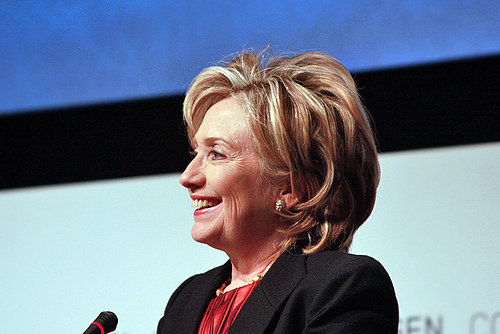
 Secretary of State Clinton stressed the importance of engagement in “defending dignity and fighting poverty” around the globe in her remarks at CARE’s 2010 National Conference and Celebration this morning. While praising organizations that promote stability, opportunity and progress so families and communities can thrive, she went on to say, “As we elevate development as a critical pillar of U.S. foreign policy and national security, right up there with diplomacy and defense, we’re taking a new approach.”
Secretary of State Clinton stressed the importance of engagement in “defending dignity and fighting poverty” around the globe in her remarks at CARE’s 2010 National Conference and Celebration this morning. While praising organizations that promote stability, opportunity and progress so families and communities can thrive, she went on to say, “As we elevate development as a critical pillar of U.S. foreign policy and national security, right up there with diplomacy and defense, we’re taking a new approach.”
This new approach, she maintains, is all about “helping our partners,” by engaging with partner countries, partner organizations and partner individuals to build up their capacity to provide for their own citizens. Once again, she voiced the importance for a focus on opportunities for women and began to emphasize a new issue, that is also linked to women and that is of emerging and critical importance: nutrition. Among the programs designed to address food security and issues of global nutrition are at the intersection of two major new policy initiatives, the Global Health Initiative and Feed the Future. And the effects of these types of programs, she claims, are aiming to accomplish three things: “Increase the amount and diversity of food grown, improve markets so people have access to that food, and increase people’s income so they can afford to buy more and better quality food and put more of their daughters and sons in school.”
Implications for these kinds of goals are essential and scientifically supported, from improving the health and welfare for pregnant mothers and their babies, to decreasing the infant mortality rate, to ensuring that children get foods that are rich in nutrients “at critical times in their development.” Furthermore, she stated: “Whether the primary focus of these programs is agriculture, health, or education, nutrition is a common thread because it’s an issue that cuts across every sector.”
Clinton also addressed budgetary concerns and the importance of support from all different types of organizations by concluding: “Because even in this time of tight budgets and extraordinarily difficult economic challenges, we know we can do more with a little bit of help that we then match – NGO, government, individual, business – and make a difference.”
Photo Credit: State Department